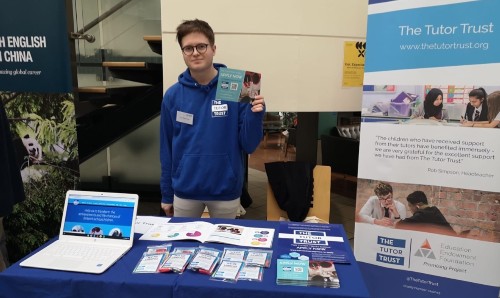
Educating the region’s school children during lockdown to minimise disadvantage
The year 2020 has been an unusual one for the whole of the UK, and for many school pupils, aside from the children of key workers, six months will have passed since they last walked through the school gates before returning to the classroom in September.
The challenge
Children and parents alike had to quickly adapt to home schooling as the COVID-19 pandemic started to peak and schools in the UK closed to prevent infections.
On top of the lack of social contact and missing their friends, some disadvantaged students, many already struggling pre-pandemic, have suffered the risk of falling behind in their education without regular teaching in the classroom. This gap in attainment is noticed by teachers after the six-week summer holidays, so after six months this mark of inequality will likely manifest even more starkly.
Adapting to need
Tutor Trust, an award-winning Manchester charity which provides professional tuition, has a strong track record in giving school children from low income families in the region a boost through extra educational support. Tutor Trust works exclusively with state schools and has been proven to be highly effective at improving the progress of disadvantaged pupils.
Many of those identified as needing additional tutoring are on free school meals. This crucial lifeline has been in the spotlight following a campaign to extend provision of meals over the summer holidays by Manchester United and England footballer Marcus Rashford, who will be awarded a University of Manchester honorary degree.
Tutor Trust wanted to ensure disadvantaged students didn’t miss out on extra tutoring during school closures and quickly adapted to provide online sessions during the pandemic. During this period, they received more applications from prospective tutors than ever before and have recruited 450 tutors during the 2019/20 academic year. Students from The University of Manchester make up 70% of those who work as Tutor Trust tutors in Manchester, all of whom are paid for their work and trained by experienced, qualified teachers.
By early May, the charity was working with six schools involved in the online tutoring scheme across Manchester, Liverpool and Leeds, and in June it was announced they would be part of the Education Endowment Foundation national pilot of online tuition.
Supporting the National Tutoring Programme
Tutor Trust, along with its University of Manchester student tutors, has been playing an instrumental role in the shaping and delivery of the UK government’s £350 million National Tutoring Programme (NTP), part of a government ‘catch-up’ plan for schools hit by COVID-19 lockdown measures, which launched on 2 November 2020.
The NTP, brings together 32 organisations which have been selected to deliver high-quality tutoring to disadvantaged pupils.
Tutor Trust co-founder and Chief Executive Officer, Nick Bent, and Abigail Shapiro, co-founder and Executive Director, said: “We are doing all we can to support teachers and to help every child achieve their potential, despite family disadvantage or the impact of COVID. We are delighted that The University of Manchester, our first ever university partner, are so strongly supporting our drive to recruit more fantastic students and graduates to tutor with us as part of the NTP."

With The University of Manchester having a key commitment to widening participation and providing opportunities to students regardless of their backgrounds to achieve the best in life, the University’s links with Tutor Trust are well aligned with our ethos and mutually-beneficial.
“University of Manchester student tutors have a passion for making a difference and serving the local community,” says Abigail Shapiro.
“All tutors in the programme have to have a grade A in the subject they're teaching for secondary school pupils, or B grades or higher in GCSE English and Maths for primary school-level tutoring, and we have a rigorous application process to ensure quality.
“Only 25-30% of those who apply are successful. University of Manchester students have high grades and hit our criteria and we’ve had 1,200 of tutors from the University to date. Our student tutors have been brilliant at rising to the challenge of tutoring during the pandemic and it’s great to hear they’ve got so much out of the experience as well as the pupils they teach.”
Sarah Jane Gilbertson, a secondary school-level Tutor Trust English tutor and University of Manchester English Literature student, said: “It was important for me personally to continue tutoring through the COVID-19 outbreak as there is already a massive attainment gap in education, which will have only grown over the course of lockdown and school closures. Coming from a working-class household myself, I know how difficult it is to succeed in education with minimal resources. Therefore, it is so important for me to help by supporting the type of students that the Tutor Trust works with so that educational success is not limited to those that can afford the extra help.”
Getting creative with blended learning
Tutor Trust are now working on a blended learning approach for the next academic year, maximising the benefits of face-to-face and online learning. They have found that pupils have been incredibly committed and online attendance of those on the programme has been very high. The tutors have also enjoyed coming up with inventive and creative ways to keep pupils engaged during online sessions.
“It was really important for me to participate in online tutoring following the outbreak of COVID-19 to keep myself occupied – having a steady and regular routine and making myself useful,” says James Brewer, a primary and secondary Maths tutor and recent University of Manchester French and Spanish graduate.
“I think this has been really beneficial for the pupils I've tutored too as they can have something to get up for and look forward to. The experience has been great because the children have really adapted well to the changes in virtual learning and have been really engaged in comparison to what I expected beforehand. I've enjoyed the interactive elements of online tuition and found that in some ways you can build a stronger relationship than face-to-face tutoring.”

